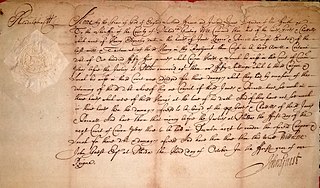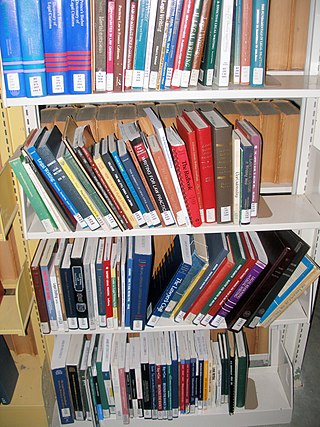
In common law legal systems, black-letter law refers to well-established legal rules that are no longer subject to reasonable dispute. Black-letter law can be contrasted with legal theory or unsettled legal issues.

English law is the common law legal system of England and Wales, comprising mainly criminal law and civil law, each branch having its own courts and procedures. The judiciary is independent, and legal principles like fairness, equality before the law, and the right to a fair trial are foundational to the system.

In common law, a writ is a formal written order issued by a body with administrative or judicial jurisdiction; in modern usage, this body is generally a court. Warrants, prerogative writs, subpoenas, and certiorari are common types of writs, but many forms exist and have existed.
The West American Digest System is a system of identifying points of law from reported cases and organizing them by topic and key number. The system was developed by West Publishing to organize the entire body of American law. This extensive taxonomy makes the process of doing case law legal research less time consuming as it directs the researcher to cases that are similar to the legal issue under consideration.

A law report or reporter is a compilation of judicial opinions from a selection of case law decided by courts. These reports serve as published records of judicial decisions that are cited by lawyers and judges for their use as precedent in subsequent cases.

A hornbook (horn-book) is a single-sided alphabet tablet, which served from medieval times as a primer for study, and sometimes included vowel combinations, numerals or short verse. The hornbook was in common use in England around 1450, but may have originated more than a century earlier. The term (hornbook) has been applied to different study materials in different fields but owes its origin to children's education, represented by a sheet of vellum or paper displaying the alphabet, religious verse, etc., protected with a translucent covering of horn and attached to a frame provided with a handle.
Legal research is "the process of identifying and retrieving information necessary to support legal decision-making. In its broadest sense, legal research includes each step of a course of action that begins with an analysis of the facts of a problem and concludes with the application and communication of the results of the investigation."
A sourcebook is a collection of texts on a particular subject intended for use as an introduction to the subject. The selected texts are typically edited, laid out, and typeset in a uniform format before binding, and the result is often a hardcover book similar to a textbook. In contrast, course readers are prepared by simply photocopying or scanning the selected materials and then adding covers, front matter, tables, and pagination, they are usually bound as softcover books, and they are usually prepared for a specific course.

A law library is a special library used by law students, lawyers, judges and their law clerks, historians, and other scholars of legal history in order to research the law. Law libraries are also used by people who draft or advocate for new laws, e.g. legislators and others who work in state government, local government, and legislative counsel offices or the U.S. Office of Law Revision Counsel and lobbying professionals. Self-represented, or pro se, litigants also use law libraries.
A casebook is a type of textbook used primarily by students in law schools. Rather than simply laying out the legal doctrine in a particular area of study, a casebook contains excerpts from legal cases in which the law of that area was applied. It is then up to the student to analyze the language of the case in order to determine what rule was applied and how the court applied it. Casebooks sometimes also contain excerpts from law review articles and legal treatises, historical notes, editorial commentary, and other related materials to provide background for the cases.

Legal writing involves the analysis of fact patterns and presentation of arguments in documents such as legal memoranda and briefs. One form of legal writing involves drafting a balanced analysis of a legal problem or issue. Another form of legal writing is persuasive, and advocates in favor of a legal position. Another form involves drafting legal instruments, such as contracts and wills.
In law, a secondary authority is an authority purporting to explain the meaning or applicability of the actual verbatim texts of primary authorities.

West is a business owned by Thomson Reuters that publishes legal, business, and regulatory information in print, and on electronic services such as Westlaw. Since the late 19th century, West has been one of the most prominent publishers of legal materials in the United States. Its headquarters is in Eagan, Minnesota; it also had an office in Rochester, New York, until it closed in 2019, and in Cleveland, Ohio, until it closed in 2010. Organizationally, West is part of the global legal division of Thomson Reuters.
The casebook method, similar to but not exactly the same as the case method, is the primary method of teaching law in law schools in the United States. It was pioneered at Harvard Law School by Christopher Columbus Langdell. It is based on the principle that rather than studying highly abstract summaries of legal rules, the best way to learn American law is to read the actual judicial opinions which become the law under the rule of stare decisis.
The Restatement (Second) of the Law of Contracts is a legal treatise from the second series of the Restatements of the Law, and seeks to inform judges and lawyers about general principles of contract common law. It is one of the best-recognized and frequently cited legal treatises in all of American jurisprudence. Every first-year law student in the United States is exposed to it, and it is a frequently cited non-binding authority in all of U.S. common law in the areas of contracts and commercial transactions. The American Law Institute began work on the second edition in 1962 and completed it in 1979; the version in use at present has a copyright year of 1981.
John de Breton was a medieval Bishop of Hereford. He served as a royal justice and sheriff before being nominated to Hereford. He is sometimes credited with the legal treatise Britton; but in its current form Breton cannot be the author as the work refers to laws written 15 years after the bishop's death.
The Oxford University Standard for Citation of Legal Authorities (OSCOLA) is a style guide that provides the modern method of legal citation in the United Kingdom; the style itself is also referred to as OSCOLA. First developed by Peter Birks of the University of Oxford Faculty of Law, and now in its 4th edition, it has been adopted by most law schools and many legal publishers in the United Kingdom. An online supplement is available for the citation of international legal cases, not covered in the main guide.
Books of authority is a term used by legal writers to refer to a number of early legal textbooks that are excepted from the rule that textbooks are not treated as authorities by the courts of England and Wales and other common law jurisdictions.
In United States legal education, hornbooks are one-volume legal treatises, written primarily for law students on subjects typically covered by law school courses.
Wayne R. LaFave is an American legal scholar who specializes in the Fourth Amendment to the U.S. Constitution and serves as the David C. Baum Professor of Law Emeritus at the University of Illinois College of Law.








